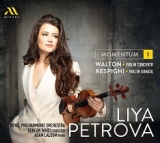Liya Petrova hat für das Album Momentum 1 in Italien komponierte Werke eingespielt. Doch darüber hinaus haben die Stücke auch andere Gemeinsamkeiten. Äußerlich zunächst im tonal verankerten Gewand erscheinend, entpuppen sie sich dann doch als moderner in ihrer Gestalt und intensiv im Ausdruck. Und beide haben ihren Platz im Repertoire erobert und erhalten.
Liya Petrovna schafft eine spannende Zusammenführung dieser beiden Stücke. An den technischen Mitteln fehlt es ihr nicht, selbst im herausfordernden Scherzo (Presto capriccioso alla napolitana) des Walton-Konzerts, das Jascha Heifetz in die Finger komponiert wurde. Petrovna versteht es, Intensität und Vorwärtsentwicklung mit weniger drängenden Teilen so zusammen zu fügen, dass sie eine konsistente Erzählung gestaltet, die einen variierenden Erzählrhythmus hat.
Im Konzert zeigt sie unverblümt, aber geschmackvoll das Überschwängliche, auch Rhapsodische der Musik inklusiver der Tanzelemente im Mittelsatz bis hin zu strahlenden Schluss. Doch sie bietet auch die moderne Musiksprache mit überzeugender Eloquenz an.
Im Konzert an ihrer Seite zeigt das Royal Philharmonic Orchestra mit Duncan Ward eine inspirierte Begleitung, die dank der gelungenen Aufnahmetechnik klar und differenziert die orchestralen Partien illuminiert. Vielleicht mag man die Solovioline ein wenig zu sehr vor das Ensemble gestellt empfinden. Etwas mehr klangliche Einbindung hätte mir gefallen.
In der Sonate spielt Adam Laloum den Klavierpart, der technisch den Interpreten deutlich mehr fordert als die Violinstimme ihr Instrument. Und er gestaltet seine Stimme mit Raffinesse und energievoll, aber immer in Abstimmung mit der Geigerin. In der Aufnahme sind beide intensiv miteinander zu hören, wie sie sich ganz dem Fluss der Musik hingeben.
Die Momentum 2-CD folgt im kommenden Jahr mit dem Konzert von Korngold und der Sonate von Strauss. Man darf gespannt sein. Diese Paarungen bietet neue Ideen für den Tonträger Markt, da Kombinationen von Konzerten mit Sonaten verschiedener Komponisten, außer vielleicht bei Barockmusik, nicht häufig anzutreffen sind. Man darf sagen, sie hat das Momentum auf ihrer Seite.
Liya Petrova has recorded works composed in Italy for the album Momentum 1. But beyond that, the pieces also have other things in common. Outwardly appearing at first in a tonally anchored garb, they then turn out to be more modern in their shape and intense in their expression. And both have conquered and maintained their place in the repertoire.
Liva Petrovna creates an exciting combination of these two pieces. She does not lack the technical means, even in the challenging scherzo Presto capriccioso alla napolitana in Walton’s Concerto composed for Jascha Heifetz. Petrovna knows how to blend intensity and forwardness with less urgent parts in such a way that she shapes a consistent narrative that has a varying rhetoric rhythm.
In concert, she bluntly but tastefully displays the exuberance, even rhapsodic, of the music including the dance elements in the middle movement to the radiant conclusion. But she also offers the modern musical language with convincing eloquence.
In the concert at her side, the Royal Philharmonic Orchestra with Duncan Ward provides an inspired accompaniment that, thanks to the successful recording technique, illuminates the orchestral parts with clarity and differentiation. Perhaps one might feel the solo violin placed a bit too much in front of the ensemble. A bit more tonal integration would have pleased me.
In the sonata Adam Laloum plays the piano part, which technically demands more from the performer than the violin part does from the violinist. He does it with refinement and energy, but always in coordination with the violinist. In the recording, both can be heard intensely together, as they give themselves completely to the flow of the music.
The Momentum 2 CD will follow next year with Korngold’s Concerto and Strauss’ Sonata. One can be curious. These pairings offer new ideas for the recording market, as combinations of concertos with sonatas by different composers are not often encountered, except perhaps in Baroque music. It’s fair to say she has the momentum on her side.






















